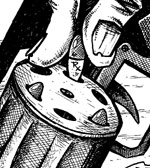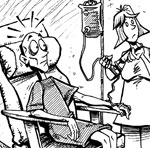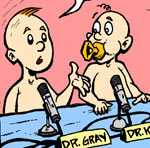Hypothyroidism and Insomnia - If You Can't Get a Good Night's Rest, Your Thyroid May Be to Blame
| Share on Facebook | Share on Twitter | Share on Google+ |
People who have hypothyroidism know that a little gland can be a big troublemaker. And one of the most persistent symptoms of untreated hypothyroidism may be an inability to get regular, restorative sleep.
The Apnea Link between Sleep Disorders and Low Thyroid Function
In hypothyroidism, the thyroid gland does not produce enough thyroid hormone for the body to use energy sources effectively. Low thyroid hormone levels can cause dry and itchy skin, a tendency to feel cold, and general fatigue during the day. Despite causing excessive daytime sleepiness, hypothyroidism is also linked to nighttime insomnia, due to the concurrence of hypothyroidism and sleep apnea.
Sleep apnea is a condition in which breathing stops during the night. The weight of tissue at the back of the palate closes off the flow of air from the nose to the throat. When air flow is stopped, the heart has to beat faster and harder to try to circulate the oxygen remaining in the bloodstream. Eventually the force of exhalation builds up so the airway is opened with a snore or a snort, disrupting sleep for a few seconds at a time over and over again, hundreds of times per night.
Of course, if you are a sleeping partner of a person with sleep apnea, your sleep may be disrupted all night!
The connection between hypothyroidism and insomnia caused by sleep apnea is overweight. When the body can't use energy efficiently, weight gain is common. The added pressure on the neck and throat from overweight aggravates insomnia in the overwhelming majority of men and women who have low thyroid function.
Other Links Between Hypothyroidism and Insomnia
But overweight is not the only way hypothyroidism can cause insomnia. In women, in particular, hypothyroidism is linked to depression. People who have both depression and hypothyroidism tend to have "mild to moderate" depression with agitation and anxiety. They are typically not anxious enough to have a serious problem functioning during the day, but they are agitated enough that they have trouble getting to sleep.
Another link between hypothyroidism and insomnia is the array of problems that go along with adjusting thyroid hormone replacement. When people have to have surgery to remove the thyroid, they immediately develop hypothyroidism, although it may be several months before they need thyroid hormone replacement.
The kind of thyroid hormone medications like Synthroid replace is called T4. The kind of thyroid hormone that the body actually uses to release energy is called T3. If you are getting enough T4 but your body is not converting it into T3, then you can have any or all of the symptoms of hypothyroidism.
Your doctor may want to add a treatment called Armour (with the "u") Thyroid. This is dried thyroid tissue from animals, which contains both T4 and T3. Or you may find that making sure you take supplemental selenium, copper, and zinc helps your body make the enzymes that convert T4 to T3, relieving insomnia and other symptoms.
Another Important Link Between Hypothyroidism and Insomnia
Often overlooked in the treatment of thyroid disease is the simple fact that there can be a long wait between the your first visit to the doctor and your getting a final diagnosis of thyroid disease or thyroid health. If you go to the doctor with a lump in your throat, it can be three to six months before you find out whether you have cancer! In these cases, dealing with anxiety and insomnia will yield benefits that make the waiting easier.
-
Skin CareMen Skin Care
-
Free ResourcesFree eBooks
-
Every human being is the author of his own health or disease.Buddha
-
Featured Health Supplement
 If you find a product that is as effective as Total Balance, and is better value for money, let us know and we will give you a refund equivalent to your entire purchases of Total Balance…retrospective.
If you find a product that is as effective as Total Balance, and is better value for money, let us know and we will give you a refund equivalent to your entire purchases of Total Balance…retrospective.
-



















